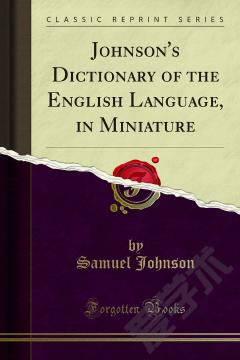Johnson's Dictionary of the English Language, in Miniature
In offering to the public this Miniature Edition of Dr. Johnson's Dictionary, the Editor takes it for granted, that the utility of such a work is universally admitted; and he considers the wide circulation of former publications of the same kind, as holding out an encouraging prospect of the general patronage that would be given to a well-directed effort to remedy the imperfections with which they have been charged. It has been his earnest endeavour to perform that service for the benefit of national education; and to supply, at a small expense, a faithful guide to those who are desirous of speaking and writing the English language with precision.He has, accordingly, bestowed great care on the subject of accentuation; and is not without hope that, in this respect, the work will be found superior to all that have preceded it. - Accent in the English language, says Sheridan, means a certain stress of the voice upon a particular letter of a syllable, which distinguishes it from the rest, and, at the same time, distinguishes the syllable itself to which it belongs from the others which compose the word. Thus, in the word hab'it, the accent upon the b distinguishes that letter from the others, and the first syllable from the last. In the word repu'te, the u is the distinguished letter, and the syllable which contains it the distinguished syllable: but in the word rep'utable, the seat of the accent is changed to the first syllable, and p becomes the distinguished letter. The great distinction of our accent depends upon its seat, which may be either upon a vowel or a consonant. Upon a vowel, as in the words glo'ry, fa'ther, ho'ly. Upon a consonant, as in the words hab'it, bat'tle, bor'row. When the accent is on the vowel, the syllable is long; because the accent is made by dwelling upon the vowel. When it is on the consonant, the syllable is short; because the accent is made by passing rapidly over the vowel, and giving a smart stroke of the voice to the following consonant. The seat of the accent, thus illustrated by Sheridan, has alone proved a more certain guide to pronunciation, than all that had been written on the subject by the most eminent of his predecessors; and therefore it has been more accurately applied in this edition of Johnson's Dictionary in Miniature, than in any that has yet been offered to the public; the accentual mark being always placed after the vowel when the syllable is long, and after the following consonant when the syllable is short. Thus, La'tent, lat'in - e'pact, ep'ic - fi'nal, fin'ish - o'ral, mor'al - pu'ny, pun'ish - remi'nd, preten'd, exhibit, alternately, an accented vowel and consonant, or an accented long and short syllable.*
{{comment.content}}








 京公网安备 11010802027623号
京公网安备 11010802027623号